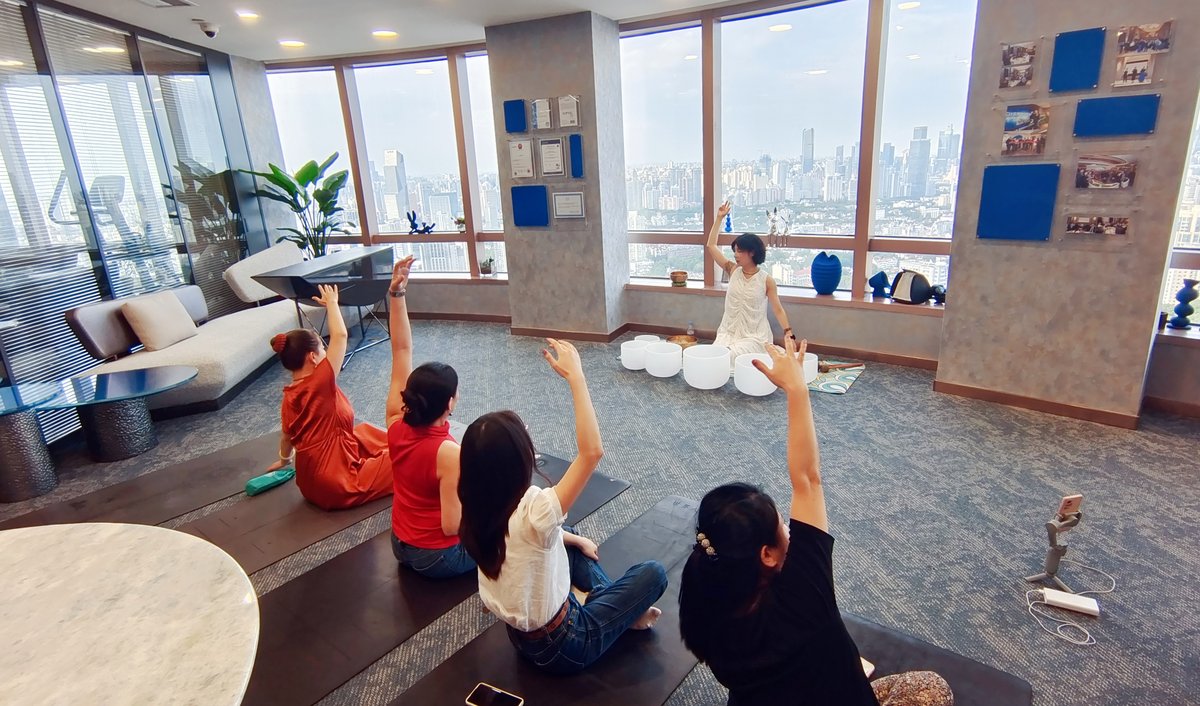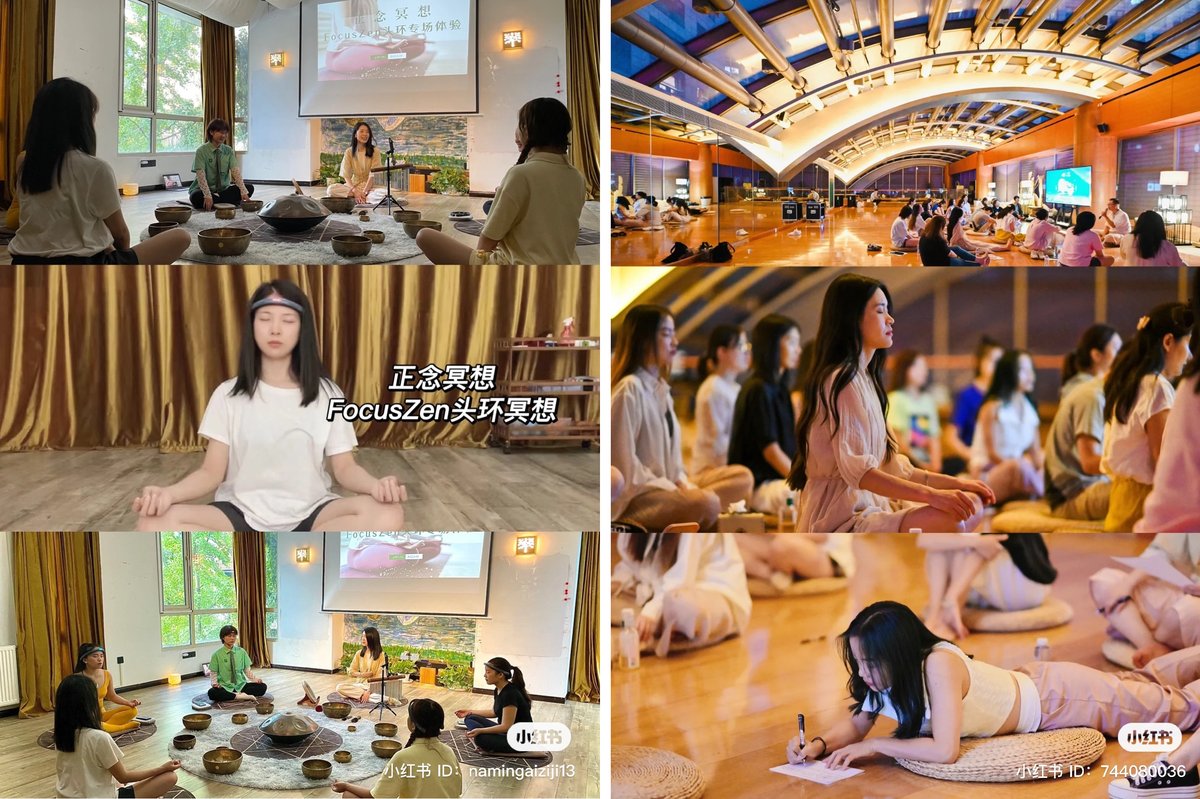As meditation and mindfulness apps continue to surge in popularity, consumers struggle to get their money’s worth
Sitting in front of her laptop inside her Beijing apartment, Fang Yingqi is in a state of focused tranquility. Eyes closed and back straight, she takes deep breaths according to the soft guidance of the tutor’s voice floating through her computer’s speakers: “Inhale and exhale…feel the temperature difference when the air comes in…and out.”
This 15-minute meditation session is part of a 4,000-yuan online mindfulness course Fang signed up for earlier this year. Stressed by her job at a venture capital firm and preoccupied with family life, Fang enrolled in the course after seeing posts about the anxiety-reducing effects of mindfulness on social media. “I think it’s a way for people to learn how to nurture their ‘inner wisdom,’” she says. “I believe with long-term practice; it could help me to clarify my thoughts.”
Fang is not alone. Mindfulness and meditation content is booming online in China as middle-class urbanites jump on a trend that has spread to the country from the US in recent years. On Ximalaya FM, China’s largest podcast platform, mindfulness (正念) and meditation (冥想) courses have over 163,000 subscribers, with users listening to related content more than 10 million times. At the offices of large technology firms like Xiaomi and Didi, there are rooms devoted to mindfulness and meditation, as well as lectures and sharing sessions regarding techniques (like those you might find in Silicon Valley).
Interest spiked during the Covid-19 pandemic, with searches for “meditation” on Baidu’s search engine nearly doubling from January to March 2020, compared with the same period during the previous year.
From free five-minute videos online by amateur practitioners to 6,000-yuan months-long courses led by renowned psychology professors, mindfulness content has become standard practice for millions of Chinese looking to unwind. But with no industry standards for courses and no established qualifications for coaches, the quality of mindfulness products varies wildly. Likewise, courses often market themselves as a miracle cure for their clients’ psychological woes, leaving many disappointed when results don’t match those advertised, and leading some to even question the efficacy of mindfulness overall.
Many of the techniques of mindfulness, like meditation, have been practiced in China for centuries through Buddhism, which first came to the country from India around 2,000 years ago. But the modern kind that has swept China in recent years first gained popularity in the US in the 1990s after Jon Kabat-Zinn, an MIT-educated scientist, developed an eight-week stress reduction course for patients suffering from chronic pain.
There are two key elements to practicing mindfulness today in China, according to Liu Xinghua, a psychology professor at Peking University who designs commercial mindfulness courses for the public. “First you have to accept the present moment, regardless of pain or happiness,” Liu told Guangming Daily in August 2022. Then “be aware of your breathing. Don’t blame yourself if you get distracted; return to feel your breath, again and again.”
In fact, “Mindfulness training may be more applicable [than formal medical treatment] to enhance an individual’s well-being in Chinese culture,” Liu told Life Times in a 2019 interview, emphasizing the Buddhist roots of modern mindfulness practice which have been linked to Chinese culture for centuries.
But, as in other countries, many in China are taking up mindfulness in response to modern anxieties, stresses, or even depressive tendencies. In 2019, the World Health Organization estimated that 54 million people in China suffer from depression, and about 41 million suffer from anxiety disorders. But China has a shortage of certified mental health professionals—just 1.7 psychiatrists per 100,000 people compared with 12 per 100,000 in the US—so mindfulness courses are attractive for their accessibility online and low cost compared with private therapy.
“Unlike psychoanalysis that relies heavily on the professional level and experience of counselors, or cognitive behavioral therapy (CBT) that requires personal discipline and monitoring, mindfulness-based stress reduction can be standardized into a ‘product’ that can be used by different people at the same time,” says Wang Sisi, a researcher at Pause Lab, an online mental health service provider with over 60,000 paid users that includes mindfulness courses in its products.
Wang, who holds a PhD in psychology from Peking University, helped design a 21-day online “Emotion Action Camp” for Pause Lab that guides beginners in mindfulness-based training, with the aim of reducing their stress and improving sleep quality.
In the camp, around 300 to 400 people (mainly women aged 25 to 35) pay around 600 yuan to receive recorded guidance and reading materials about recognizing and controlling their emotions. They keep diaries for the duration of the course, and also enter a group chat with tutors who answer their questions and encourage them to finish their daily practices.
A survey by the company last year found that most customers joined to raise their concentration levels, cope with pressure, ease negative emotions, and improve their acceptance of themselves. “Many live in first- and second-tier cities, are well-educated, and are in a period of career development but face pressure from themselves, interpersonal relationships, and their family,” says Pause Lab’s founder, Guo Tingting. “[They] want some tools for stress relief and self-growth.”
Song Xiaobo, a 28-year-old scriptwriter in Shenzhen, Guangdong province, joined a mindfulness class two months ago intending to become “satisfied with myself, more efficient at work, and to stop blaming myself for procrastination.”
Like Fang Yingqi, Song first learned about mindfulness on social media, via China’s popular social media app Xiaohongshu, on which there are as many as 340,000 posts related to “mindfulness and meditation.”
“The vlogger I followed told her story of finding inner peace and improving her life by practicing mindfulness for four weeks,” Song tells TWOC. After the vlogger’s mindfulness experience, “I saw that she went to the gym regularly, studied painting, and kept her own journal, all while accomplishing everything she wanted in her life and work.”
Song paid 2,000 yuan for an online course, but failed to see benefits at first: “The other night I quarreled with my parents and I yelled. I was aware I should stop and focus on my breathing like the mindfulness tutor told me to, but I couldn’t.”
Song also found herself distracted during meditation, even conjuring uncomfortable childhood memories as she sat still in prolonged silence. Her struggles made her frustrated with the course and she even blamed it for increasing her anxiety.
Fang, whose course was developed by Liu Xinghua, the professor at Peking University, found that after more than five weeks of training, although the course had increased her awareness of her emotions, it also “led me to spend more time fixating on those problems and maybe caused further anxiety.” When she asked her tutor for advice “she gave me a five-step solution that I found too theoretical and not practical.”
Zhou Jiaqi, another mindfulness tutor at Peking University (who wished to use a pseudonym), admits “there are many people who quit [courses] as they did not see the changes they expected.” But, when told of Song’s case, she says many people experience the same difficulties, and with persistent practice Song could see improved results. Zhou also suggests Song may have had overly high hopes for her course. “It’s likely she set the wrong expectation or was misled by advertisements for mindfulness-based therapy,” she tells TWOC.
Overhype and mixed messages plague much of the marketing around mindfulness. Courses often boast about a wide range of benefits from stress reduction to better parent-child relationships, weight loss and even the ability to make better investment decisions. On video platform Bilibili, scores of videos, most less than 10 minutes long, make claims to “take you on a journey,” “relax your body,” or “prevent anxiety.” One video with 40,000 views is titled: “It’s Cured 40 Million People’s Breathing: Effective After One Try.”
Professor Liu tells TWOC that scientific studies have verified the effects of mindfulness meditation to improve an individual’s ability to deal with negative emotions and stress. A study by researchers from Georgetown University Medical Center published in November 2022, showed that an eight-week mindfulness course was just as effective against anxiety disorders as antidepressant medication. In the study, 102 subjects participated in ”mindfulness-based stress reduction” which included 45 minutes of daily home practice and 150 minutes of offline meditation classes every week. They reported a 30 percent drop in anxiety levels after two months.
But many who take online mindfulness courses in China, or those who just occasionally watch mindfulness videos, do not have professional teachers guiding them; many sessions are just a few minutes long, and online courses often last far less than eight weeks. The Pause Lab course that Wang Sisi helped design, for example, lasts only 21 days. Furthermore, in the absence of scientific studies, it’s difficult to compare or prove the effectiveness of commercial online courses, and there are no industry standards.
Liu suggests consumers should look for coaches with psychology degrees from well-known universities. However, beyond academic credentials there is no standardized system for certifying or confirming the skills of mindfulness tutors in China. Often consumers must rely on reviews from previous clients to evaluate the credibility of courses.
Wang believes people can’t just rely on mindfulness to solve their issues: “For example, if I want to use mindfulness to solve my sleep problems, I may also need to learn about sleep more generally and other methods to cure insomnia.”
However, it seems likely the industry will continue to grow. Despite a slow start, Song eventually noticed some benefits from her course. At work recently, she argued with her manager in a meeting: “I suddenly realized: I was fighting to protect my idea and to verify it, because I felt that if my idea was proved wrong, then…it would be like I didn’t exist.”
By trying to let go of her emotions, as she learned in her course, she began to gain new acceptance of herself. “A thought is just a thought. It is not the center of my world…It doesn’t affect my self-identity,” she says. “At that moment, I was free.”














